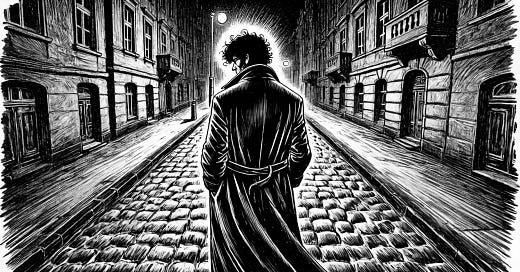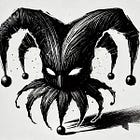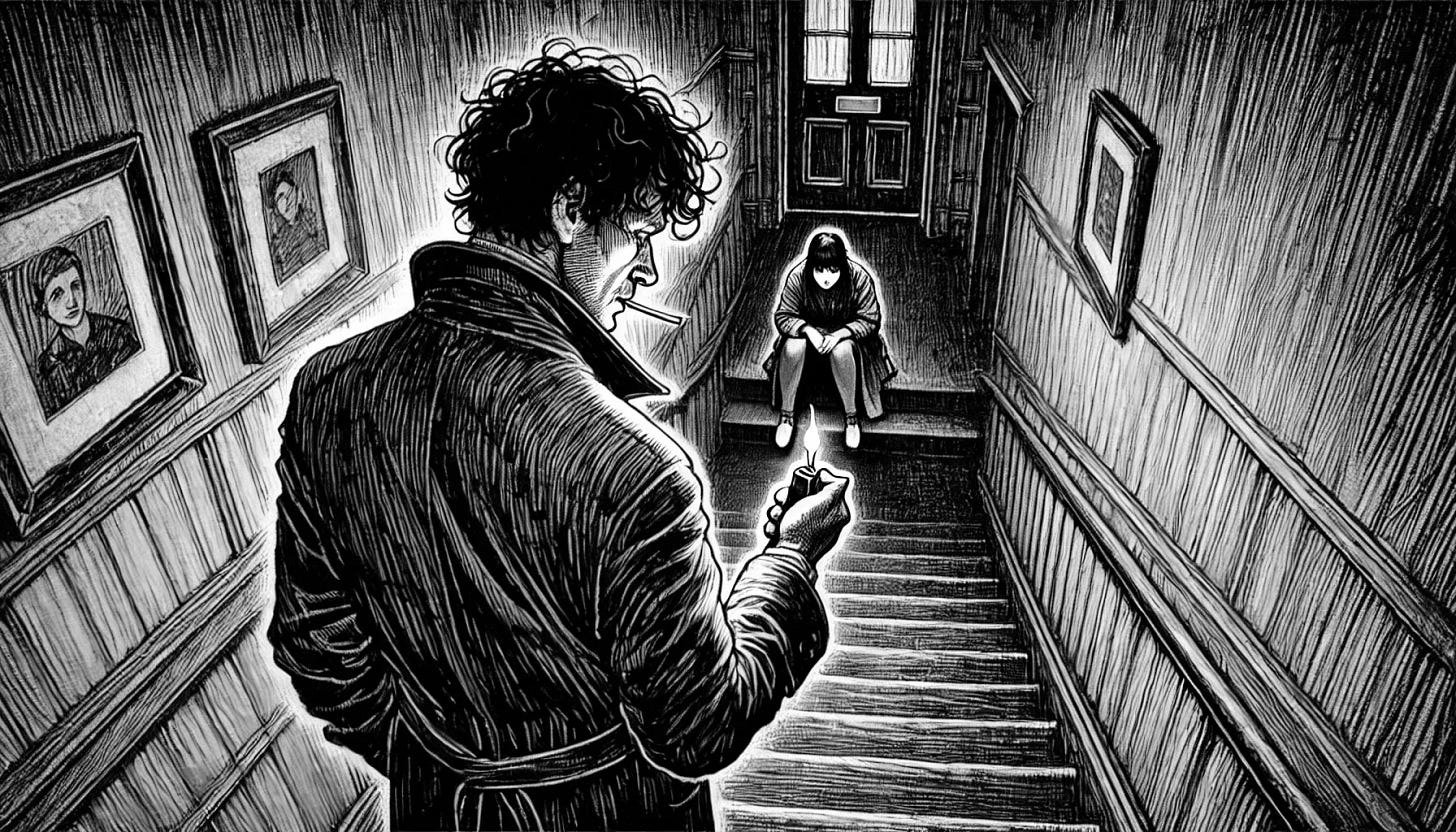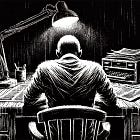The beer mug is empty, with just a bit of foam clinging to the inside of the glass. The waiter has just cleared away the pizza plate. The restaurant is slowly starting to fill up. Cardona takes out his notebook and flips through it, retracing the key points in reverse order. The will, the Golden Share, the car, the movements.
He circles the movements from the last two days before the death twice—those in the early morning and late evening of the day before the death, and the trip to Sorrento on the morning of September 6th.
He knows that what happened during those times is the key. It’s all that matters in this investigation.
- Anything else, sir?
- No, thank you. - He replies without looking up from his notes.
- A dessert, an amaro, a limoncello?
- Nothing, thank you.
- Coffee?
- Just bring me the bill. - He says, looking up and glaring at the waiter.
- As you wish.
The waiter walks away, and Cardona returns to his notes. There’s still a lot of material to go through. The plan is this: two days to pull together a detailed report on the situation, highlighting all the questions and underlining the inconsistencies. There’s a structure of events forming in his mind. He just needs to fill it with facts—the substance to support the framework. Only a few more pieces are missing.
He has an idea. Since the night has to pass somehow, and he’s already eaten, the thought of reopening the files doesn’t appeal to him at all. This thing has been on his mind since the early stages of the investigation, and now he knows where to go. He puts his hand in his pocket and pulls out the three sets of keys he recovered. He sets aside the first one—the one used to open his office. The other two remain.
- Excuse me, I need the bill. I’m leaving. - He says irritably as the waiter passes by again.
- I’ll bring it right away. - The waiter responds without stopping.
Cardona collects his notebook and tucks it into his pocket. Then he takes a twenty-euro note from his wallet. The waiter places a metal plate with a non-fiscal receipt for eighteen euros on the table and starts to walk away. The commissioner stops him with an arm and hands him the note.
- Bring me the change and the receipt. - He says, pulling a cigarette from the inside pocket of his coat. - Hurry, I’m leaving.
The waiter walks away without speaking, and Cardona heads toward the exit. The place is small, with three rows of square tables filling the room. Many are still empty. The commissioner pushes the door open with his shoulder and lights his cigarette while still on the threshold. A light, cold wind blows outside. His car is parked just a little further on. Via Carducci is only a few minutes’ walk away. On a Friday night, there’s no chance of finding parking closer than this, and he has no intention of leaving the car in a garage.
- Here you go, sir. - The waiter says, handing him a two-euro coin placed on top of the receipt.
The commissioner pockets the change and heads toward his destination.
The street is pedestrian-only and not very crowded. He walks quickly, hands in his pockets and head down. The basalt slabs pass quickly beneath his feet. He wonders why. Why would Umberto Solimena lie? He tries to find a justification, a reason for which this statement could be in good faith. He imagines a taxi. Yes. Or a bicycle, a motorcycle. There could be anything—a second car.
He grinds his teeth and clenches his jaw. An eventuality he hadn’t considered. He’s falling in love with his hypothesis again, just like before, and he still hasn’t shaken this flaw. He scratches his chin and grimaces. Maybe he really did go to see him that night. He pulls out his notebook and checks the page dedicated to Umberto Solimena. He lives in Posillipo, on Via Pacuvio—far from here, not an easy trip to make by bicycle. Maybe it was a scooter. He takes a pen from the notebook pocket and writes, “check motor vehicle registry.” He could have taken a taxi, so he adds “taxi cooperatives.” It’s already Friday night, and the offices are closed tomorrow, but maybe he can find something online for the cars, and the taxi drivers work every day—he’ll call tomorrow anyway. It’s not even certain they keep records of the calls, assuming he called one. He could have just flagged one down on the street. Maybe he was walking here, on Via Chiaia, thinking of his nephews, suddenly deciding to go see them as he pondered his life, his fate, walking over these dark basalt slabs, under these trees. The commissioner lifts his head. On either side of the street, young trees cover the view of the buildings with their foliage. Around him, there are few people, and the light weakly penetrates through the forty meters of trees that lead down to a small paved square. To the left, there’s a neat row of white taxis.
There. He comes here, takes the first taxi, gets in, and says, “Via Pacuvio” to the driver. No second thoughts.
It’s possible.
Cardona lets his gaze drift away from the taxi stand and pays attention to the sparse traffic continuing toward Via Filangieri. He puts the notebook and pen back in his pocket, turns right, and enters a narrow alley. The basalt is wet and shiny.
He could have really gone there. He can’t find a reason to deny it. There’s nothing—the elements he has can’t refute it, and it remains just a contestable reconstruction.
He feels the tension in his neck. In his pocket, he grips the two sets of keys he still hasn’t used and from which he expects some answers. He rubs his fingertips against them, wishing they’d turn to gold.
His soles thud against the uneven pavement in a steady rhythm, each step marking his thoughts at a precise, constant pace. One after another, he unravels his frustration until he admits that this shouldn’t be a problem. He shouldn’t worry about justifying what he thinks but rather focus on building his certainty. Just like he’s doing now, walking down this street. A few days ago, it was all little more than a feeling—newspaper articles, the colors of that plant, the face of that boy, the silence of the office while he thought it over. And now that what he instinctively guessed has been confirmed, he just has to clear the dust from the picture, reveal the details, one by one. The pieces that will complete the puzzle. There are some clear areas and others that are still dark. Walking, he’ll find the pieces. They’ll appear right under his nose, just like everything else so far. He just has to keep walking down this path. He feels it in his gut. He repeats these words to himself, and the sense of unease fades. He’s here on this street for more answers—he’s not walking in circles but toward a destination he knows. It might take months, or it might take hours. But he knows where he’s going. He’s reaching his destination, and with him, he carries the experiences, the information, the words of those orbiting this story—planets or comets, polar stars or just dust and debris. Right now, he feels like a great magnet, and it makes him feel good.
He’s on Via Carducci. On the left is the large building of Liceo Umberto. He turns left until he sees the building’s number and continues down, following the sequence.
He feels lighter. It’s going to be an interesting evening. He can feel it.
It’s number ten. He stops. He opens his notebook and checks the address. Then he closes it.
He approaches the intercom and looks for his name. He doesn’t find it. There are many surnames stacked one above the other, the sequence flowing uniformly from the first column on the left to the second, where there’s a break in the pattern. Two letters, an “S” and an “M”, printed in black on a strip of white paper that’s yellowing with age. The intercom number is 510.
He pulls the keys from his pocket and moves closer to the door. Two of them are the right size to fit the aluminum door lock. He inserts the first one and turns it; the door opens, and he steps inside. On the right is the doorman’s booth, and to the left are the mailboxes. He walks over to peek inside the box labeled with the two letters. It’s empty. He stares at it for a moment, then heads toward the elevator and presses the button.
The display shows that the elevator was parked on the fifth floor. The number disappears and reappears each time the elevator passes through the other four floors. It’s a fleeting flash. The light in the hall is cold, coming from a neon lamp placed in the center of the lobby, covered by a round glass lampshade. Simple, cheap, not very appealing in design. The doorman’s booth is made of brown anodized aluminum profiles. It’s less than a meter wide and two meters deep. From here, he can see the thin desk and the sliding window that opens onto the lobby. It’s dark, and not much can be seen inside—just a small TV with two crooked antennas, the outline of a dark chair back, and various papers and documents in disarray.
The doors open behind him, casting his long shadow on the floor, betraying the white light that pressed it to the ground under his feet.
The commissioner steps back into the elevator. He continues to look at the lobby, as if trying to memorize it. Then he glances to his right at the control panel and presses the button for the fifth floor.
The doors close, and the elevator begins its ascent. Inside the cabin, there’s a sweet smell. The walls are made of smooth aluminum sheets, with scratches about a meter from the ground running around the perimeter. The floor is worn black linoleum, scuffed by countless feet. The light is warm, coming from two lamps placed in a recess in the white ceiling. On one wall, there’s a message written in black marker. The writing is stylized, hard to read. It starts with an “A”, but Cardona can’t make out the other letters. He reaches into his pocket, pulls out a cigarette, and puts it in his mouth.
The elevator arrives at the floor and stops with a jolt. The doors open, and once again, the warm light of the elevator clashes unpleasantly with the cold lighting of the building.
The commissioner steps out of the cabin. He brings the lighter to the tip of his cigarette and flicks the wheel. The spark catches, and a small flame lights the tobacco. That’s when he notices a shadow to his left. He takes a drag and turns.
On the stairs leading up, a girl is sitting. Her hair is tied in a ponytail. She looks tired, with deep circles under her eyes. She stares at him silently, her legs pulled up, her arms wrapped around her knees, hugging them to her chest. Her thin shoulders are covered by a green raincoat.
The commissioner glances at the apartment number above the door she’s sitting next to. It’s 510. He takes another drag and takes a step toward her. She pulls back slightly, her back pressing against the wall.
The commissioner removes the cigarette from his mouth and looks at her.
- And you. - He stops, locking eyes with her. Who are you?
Copyright © The MaDMan, 2013. All rights reserved.
No part of this publication may be reproduced, distributed, or transmitted in any form without permission.










At last, they meet. Woohoo. I've been anticipating this for a while. I like how they each had different reasons for going there but are there at the same time regardless. Wonderful pacing here. Loving it.